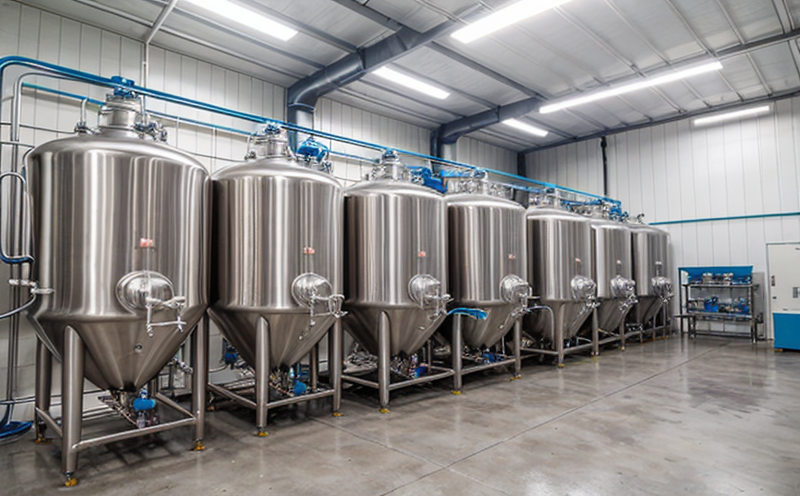ISO 20128 Lactic Acid Bacteria Detection in Fermentation Systems
The ISO 20128 standard provides a robust framework for detecting lactic acid bacteria (LAB) in fermentation systems, ensuring product quality and safety. This service is crucial for industries such as food & beverage, pharmaceuticals, and biotechnology, where LAB play a pivotal role.
LAB are microorganisms that produce lactic acid through the metabolism of carbohydrates. They are essential in many industrial processes, including cheese production, yogurt manufacturing, and fermentation in general. The presence of these bacteria can significantly influence the taste, texture, shelf life, and overall quality of products. Detecting LAB using ISO 20128 ensures that these microorganisms do not compromise product integrity.
Our service leverages advanced microbiological testing techniques to identify the species and strains of lactic acid bacteria present in fermentation systems. This process involves several key steps:
- Sample collection: Carefully selected samples are taken from various points within the fermentation system.
- Culture media: Specific culture media are used to selectively grow LAB while suppressing other microorganisms.
- Spectrophotometric measurement: The growth of LAB is quantified using spectrophotometry, providing precise counts and concentrations.
- Identification: Advanced molecular techniques, such as PCR-based methods or mass spectrometry, are employed for species-level identification.
The accuracy and reliability of the ISO 20128 standard make it a cornerstone in ensuring that fermentation processes meet regulatory and quality standards. This service is not only beneficial for maintaining product consistency but also for identifying potential sources of contamination or spoilage.
For industries relying on LAB, this service can help optimize production processes by:
- Ensuring consistent microbial growth,
- Detecting and preventing contamination,
- Improving product quality and safety,
- Complying with international standards.
The use of ISO 20128 in industrial fermentation systems is critical for maintaining the integrity and reputation of products. By adhering to this standard, companies can ensure that their processes are not only efficient but also compliant with global regulatory requirements.
Scope and Methodology
The scope of our ISO 20128 Lactic Acid Bacteria Detection service encompasses the entire fermentation process. We focus on identifying lactic acid bacteria species present in various stages, from initial inoculation to final product formulation.
The methodology involves a series of carefully designed steps:
- Sample Collection: Samples are collected at strategic points within the fermentation system using sterile techniques to avoid contamination.
- Culture Media Selection: Specific media are chosen based on the expected LAB species, ensuring optimal growth conditions.
- Spectrophotometric Measurement: The growth of LAB is quantified spectrophotometrically, providing accurate counts and concentrations.
- Identification Techniques: Advanced molecular techniques, such as PCR or mass spectrometry, are used for species-level identification.
The process adheres strictly to ISO 20128, ensuring that all steps are conducted under controlled conditions. This approach guarantees the accuracy and reliability of the results.
Our team uses state-of-the-art instrumentation, including high-performance liquid chromatography (HPLC) and advanced spectrophotometers, to ensure precise measurements and accurate identifications. The use of these tools ensures that our findings are both repeatable and reproducible, meeting international standards for quality assurance.
Benefits
The benefits of our ISO 20128 Lactic Acid Bacteria Detection service extend beyond mere compliance with industry standards. It offers several advantages to clients in the food & beverage, pharmaceutical, and biotechnology sectors:
- Enhanced Product Quality: By detecting LAB at critical points in the fermentation process, we ensure that products meet the highest quality standards.
- Precision and Reliability: Our use of advanced techniques ensures accurate and reliable results, providing peace of mind to our clients.
- Regulatory Compliance: Adherence to international standards such as ISO 20128 helps ensure that products meet regulatory requirements.
- Optimized Processes: Identifying potential sources of contamination or spoilage can help optimize production processes and reduce waste.
- Consistency in Production: By maintaining consistent microbial growth, we help clients achieve more predictable and reliable product outcomes.
- Customer Satisfaction: Ensuring product quality and safety leads to higher customer satisfaction and loyalty.
- Brand Reputation: Compliance with international standards enhances a company's reputation in the market.
In summary, our service not only ensures compliance but also contributes significantly to the overall success of fermentation processes by enhancing product quality, optimizing production efficiency, and maintaining regulatory adherence.





